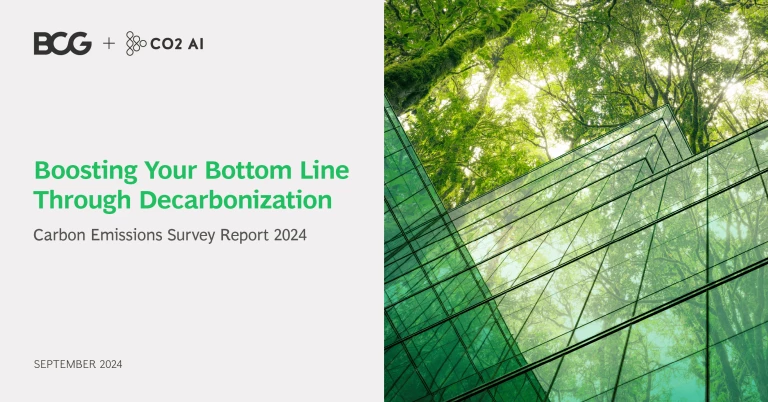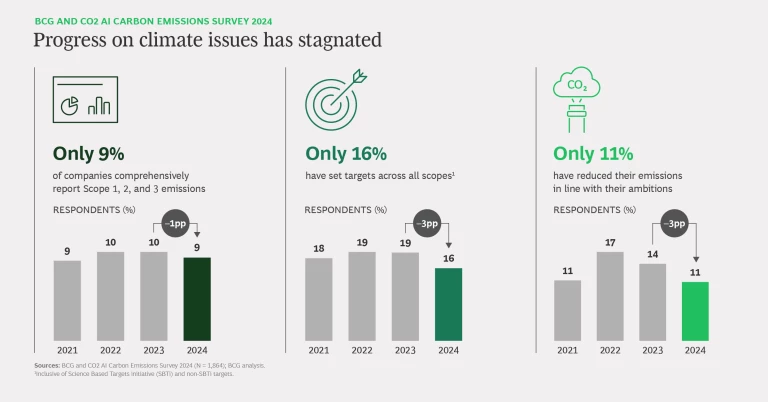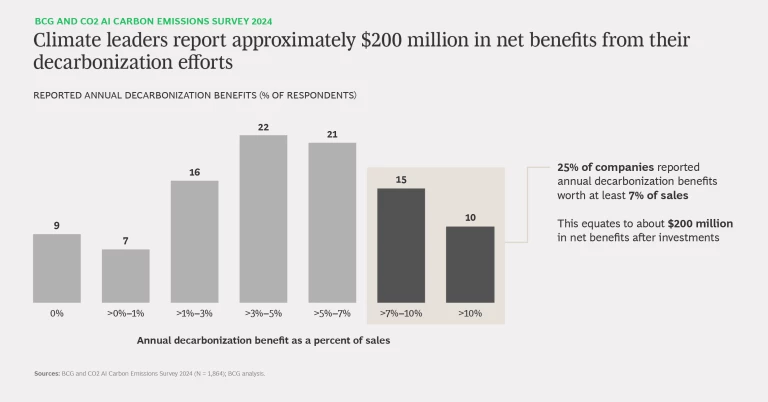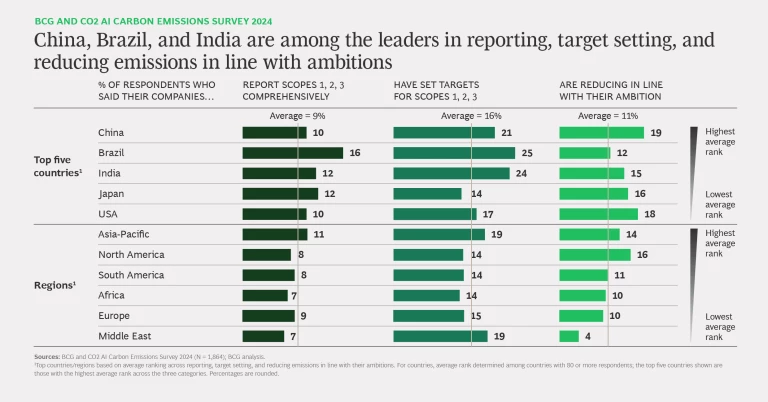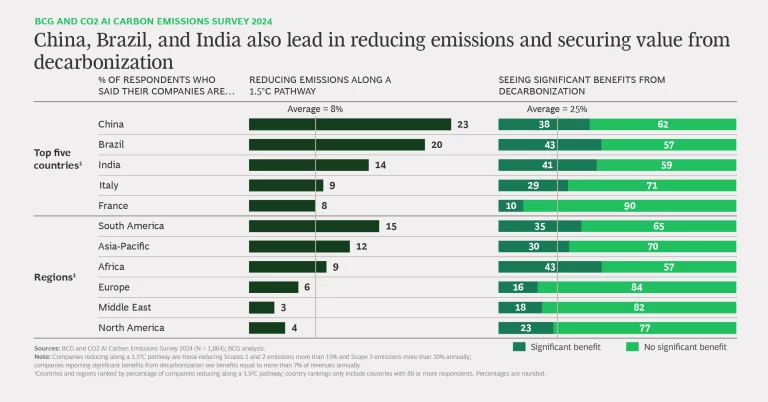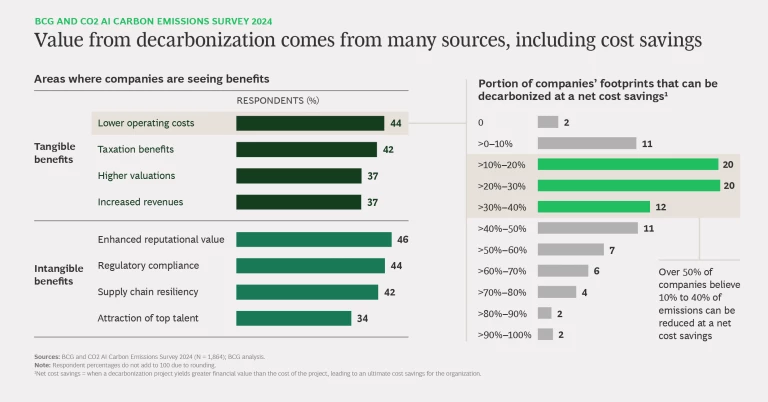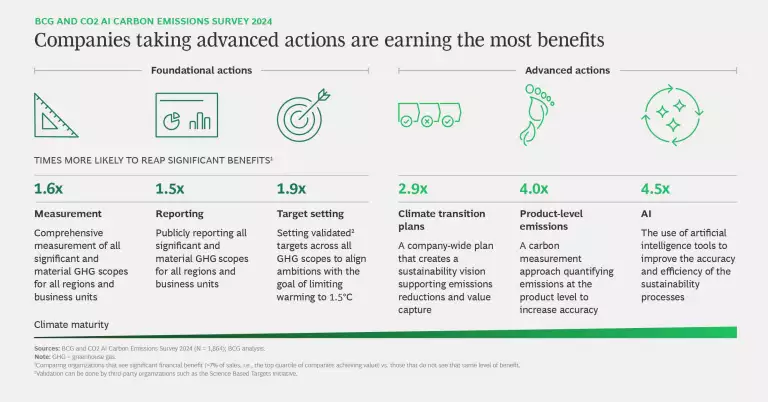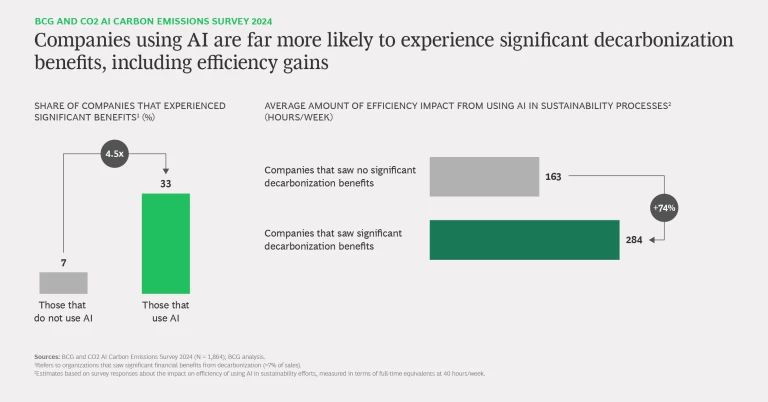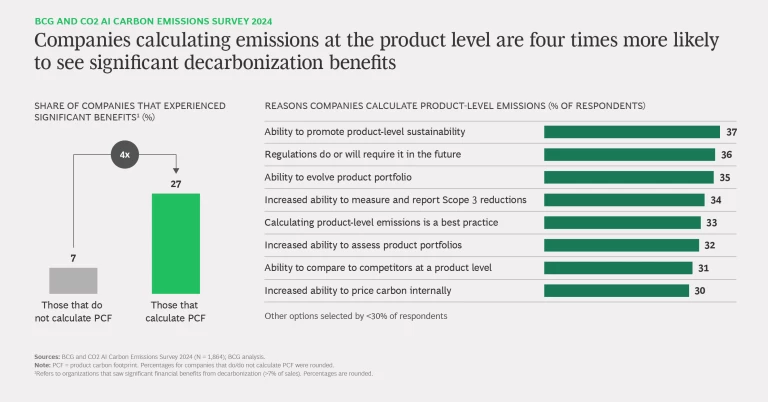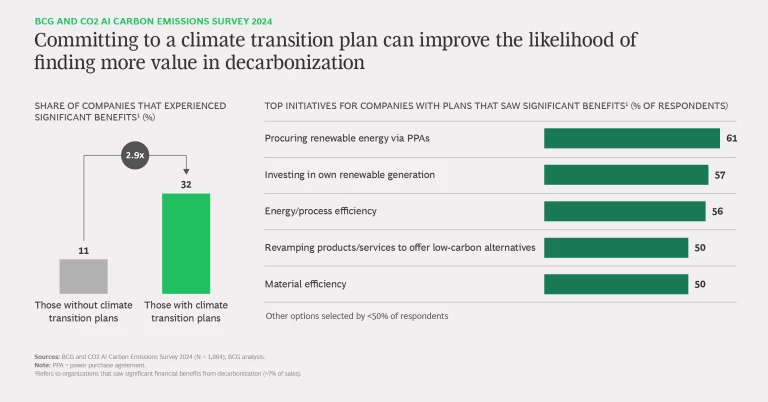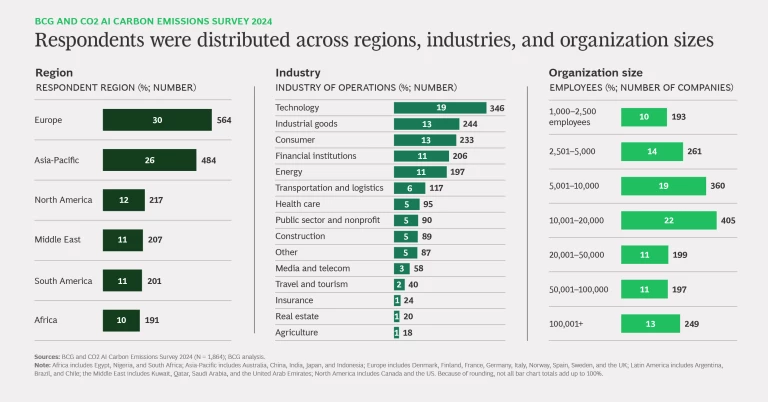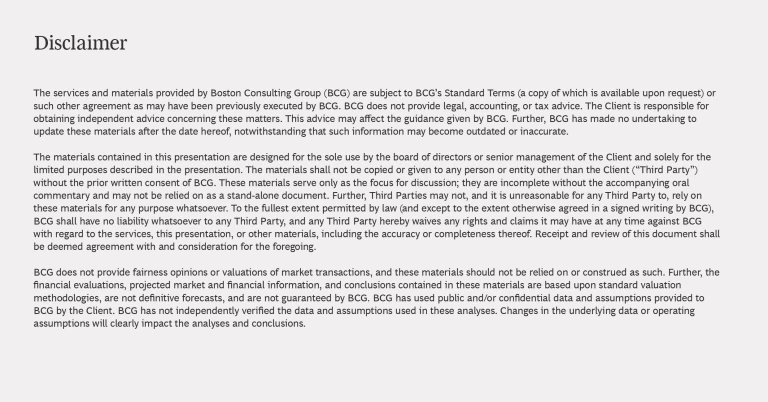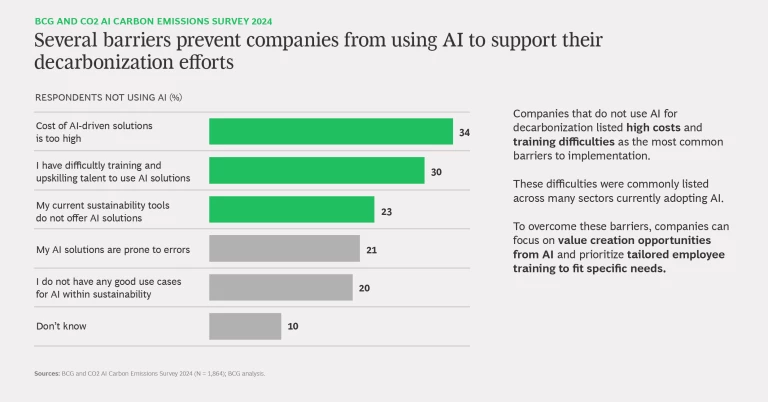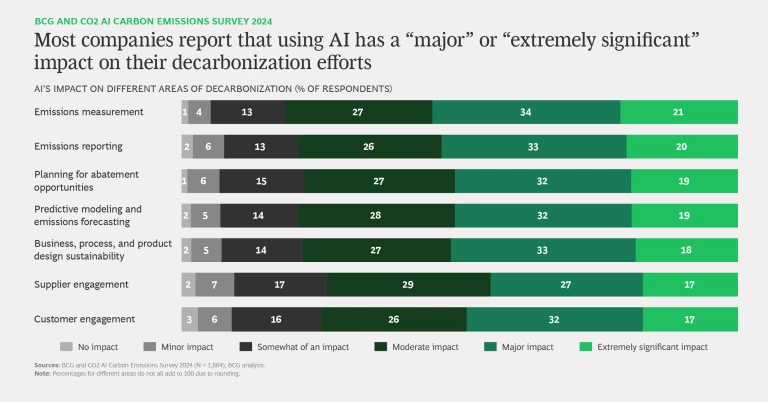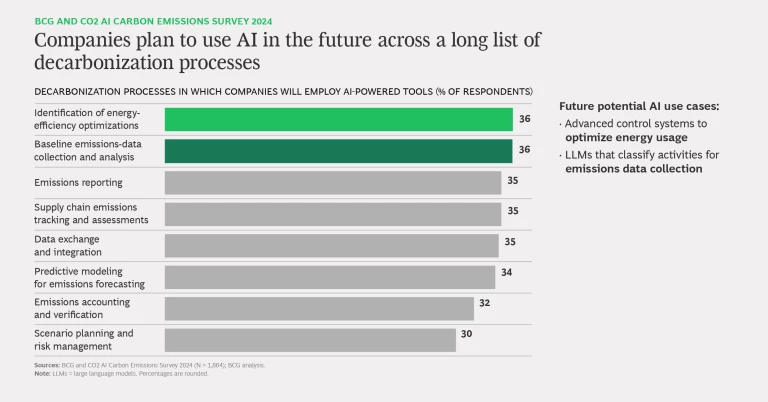Despite the worsening climate crisis—and despite 2023 being the hottest year on record—corporate progress on decarbonization has slowed. Our latest survey finds that responding companies have made little headway on climate issues over the past year.
However, many of the climate leaders in our survey have realized significant value from their decarbonization efforts, including financial benefits equal to more than 7% of their revenues—for an average net benefit of $200 million a year. To achieve these financial benefits, leading companies are stepping beyond foundational actions, such as measuring and reporting emissions, and adopting more advanced actions—including using AI in their climate efforts and calculating product-level emissions—to support their decarbonization journeys.
In this year’s edition of the BCG + CO2 AI Carbon Emissions Survey, we polled executives from businesses around the world that are, collectively, responsible for about 45% of global greenhouse-gas (GHG) emissions. This survey continues the work that we began in 2021 and continued in 2022 and 2023 to investigate the progress companies have made on emissions measurement and reduction—and to shed light on the actions they can take to decelerate climate change.
Leaders Are Reaping the Rewards
Of the nearly 2,000 companies we surveyed in 2024, just 9% said they comprehensively report Scope 1, 2, and 3 emissions. In addition, only 16% said they have set targets across all three scopes, while just 11% reported emissions reductions in line with their set ambitions. These statistics are all lower than those reported in 2023.
Methodology
Nonetheless, there are some bright spots. Companies in Brazil, India, and China are leading in terms of comprehensive emissions reporting, target setting, and reducing emissions in line with ambitions. And even as overall progress seemed to slow, 25% of the businesses in our survey reported substantial financial benefits from decarbonization.
One of the leading sources of these benefits was a reduction in operating costs, often resulting from initiatives focused on efficiency, waste reduction, the rationalization of materials or footprints, or the use of renewable energy.
Cost-Neutral Decarbonization. More than half of the companies surveyed reported that they believe their emissions can be reduced by 10% to 40% at a net cost savings. Reckitt, a multinational consumer goods company, did so through product innovation. One initiative, for example, cut Scope 3 emissions associated with the company’s Air Wick brand by reducing emissions in transportation, manufacturing, and the raw materials used to create the fragrances. According to David Croft, Reckitt’s group head of sustainability, “Our sustainable product innovation process gives us the opportunity to enable decarbonization at scale and focus on the areas where we can make the most impact on carbon.”
Leading Countries. Leading climate beneficiaries were most often found in countries that excel in measurement, reporting, and target setting and that are highly aligned with reducing their emissions according to a 1.5ºC pathway. Having a sizeable portion of companies that are decarbonizing at net financial benefit is a major success for large countries and could have an immense global impact.
Tech + Us: Harness the power of technology and AI
Powerful Climate Action
The climate beneficiaries in our survey capture value by excelling in both foundational and advanced climate actions. Foundational actions are the first steps in a company’s decarbonization journey. Maximizing these actions often results in excellence in decarbonization and significant value capture:
- Measurement. Companies measuring all three scopes comprehensively are 1.6 times more likely to experience significant decarbonization benefits.
- Reporting. Companies fully reporting each scope are 1.5 times more likely to experience significant decarbonization benefits.
- Target Setting. Companies setting validated targets for each scope are 1.9 times more likely to experience significant decarbonization benefits.
Alongside these foundational elements, companies can increase their emissions reduction and potential rewards by taking advanced actions. Our survey found that these advanced actions, typically enabled by technology investments, increase accuracy, impact, and value capture.
AI Usage. Companies that use AI to help reduce emissions are 4.5 times more likely to experience significant decarbonization benefits. This is primarily because AI-powered tools increase the efficiency of sustainability efforts by automating tasks, allowing teams to focus more on strategic activities, such as emission reductions and value capture. (See “The Promise of AI.”)
The Promise of AI
- Identifying opportunities for bolstering energy efficiency by optimizing variables such as ambient temperatures, energy prices, and energy sources.
- Collecting and analyzing emissions data through tools such as large language models, which can classify activities and products and match them to emissions factors.
Finally, as companies increasingly leverage AI for decarbonization and other applications, they should consider AI’s energy requirements and their impact on Scope 3 emissions, as increased demand for AI has driven higher emissions for large AI providers. Organizations must therefore consider both the benefits and the drawbacks when leveraging AI in their sustainability efforts.
For example, a global multicategory food company used AI to improve its emissions measurement. Due to heavy reliance on its suppliers’ products, 98% of the company’s carbon footprint is in Scope 3. Accurately calculating these emissions had become a daunting task. To resolve the issue, the company used AI to match more than 115,000 products to individual emissions factors. This effort significantly automated the company’s emissions-measurement process, improving accuracy and increasing efficiency.
Product-Level Emissions. Companies that calculate product-level emissions are four times more likely to experience significant decarbonization benefits. The goal of measuring product-level emissions is to quantify the climate impact of a product throughout its life cycle, at the unit level. Doing so enables portfolio optimization, the support of green claims, and many other potential decarbonization improvements. In addition, companies say that these calculations allow them to prepare for future regulations and advertise product-level sustainability.
Calculating high-quality product-level emissions is significantly more difficult than calculating a corporate-level GHG footprint due to the extensive supplier partnership, data processing, and analysis required. However, while the effort involved is substantial, the benefits are clear.
Symrise, a global supplier of ingredients for fragrances, flavorings, and active ingredients for cosmetics, has begun computing product carbon footprints (PCFs) for a large portion of its 35,000 products. To take on this monumental challenge, Symrise industrialized its PCF process, helping the company meet the requirements of various standards (including Together for Sustainability, Product Environmental Footprint, and others) across its diverse portfolio and ensure the success of its sustainability initiatives.
Climate Transition Plans. Companies that adopt a climate transition plan are 2.9 times more likely to experience significant decarbonization benefits and 3.3 times more likely to reduce emissions in accordance with a 1.5ºC pathway. Climate transition plans outline how a company will achieve its climate goals via abatement initiatives while showing a serious commitment to measuring, reporting, and meeting targets. The most successful plans clearly enable companies to maximize not only their decarbonization efforts but their benefits as well.
A Pathway to Sustainability
This year’s survey reveals the substantial benefits accruing to many companies from decarbonization. Climate beneficiaries are seeing not only significant financial returns, but reputational and other benefits as well. They are doing so by excelling at foundational actions, such as measurement and reporting, and by taking more advanced actions that capture additional efficiencies, support regulatory compliance, and indicate the seriousness of their commitment to a sustainable future.

